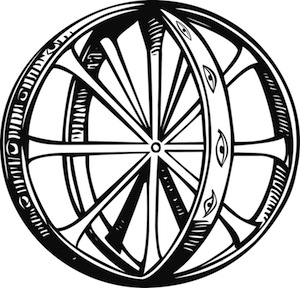 If we don’t think about interpretation as decoding an encrypted meaning intrinsic to a particular expression, what do I propose that we think about interpretive processes (and especially the hard kind of interpretation, where we’re genuinely puzzled by an expression about which we care)? First, when we’re trying to puzzle out an interpretation we want to, try to, learn more about that expression. We accumulate some data about the expression and about features of the expression that seem salient to us based on our histories of successful interpretation. Very often we hark back to the question of what somebody wanted us to apprehend from an expression, asking “What did she mean?” and imitating Sherlock Holmes or the CSI team, searching for clues. At other times we put less emphasis on intention (for good enough reasons), but here I submit that our cardinal activity involves digging, researching, musing, parsing, seeking — wanting more information about the expression in the expectation that when we know more about it, we will perceive how best to interpret the expression in question.
If we don’t think about interpretation as decoding an encrypted meaning intrinsic to a particular expression, what do I propose that we think about interpretive processes (and especially the hard kind of interpretation, where we’re genuinely puzzled by an expression about which we care)? First, when we’re trying to puzzle out an interpretation we want to, try to, learn more about that expression. We accumulate some data about the expression and about features of the expression that seem salient to us based on our histories of successful interpretation. Very often we hark back to the question of what somebody wanted us to apprehend from an expression, asking “What did she mean?” and imitating Sherlock Holmes or the CSI team, searching for clues. At other times we put less emphasis on intention (for good enough reasons), but here I submit that our cardinal activity involves digging, researching, musing, parsing, seeking — wanting more information about the expression in the expectation that when we know more about it, we will perceive how best to interpret the expression in question.
Second — granted that we’ve turned up additional information of various sorts — we pursue a variety of activities that (ideally) help us to identify a satisfying paradigm for interpreting the expression in question. We analyse the expression, breaking it down into smaller bits; we correlate it, identifying it as a single example of a larger body of known data; we aggregate it, associating it as one data point in a greater field, which might be differentially weighted and assessed; and sometimes we explode it, project from it to fields and possibilities defined less by data already in hand than by hypotheticals we imagine on the basis of the expression. These are very rough and ready distinctions — I’ve already forgotten one or two, and I’ve changed the way I describe these even as I’m typing, so I’m sure I’m wrong about some of this and you can help me do it better — but they serve the heuristic purpose of underscoring that (for instance) looking a word up in a dictionary, or trying to remember why a saint might be depicted with a square halo, or other such activities differ from identifying an expression as a parable, or a devotional icon, or a delicious bowl of lentil soup; how saying that “All Cretans are liars” differs from “Very often, Cretans have lied to me and my family, although not always, so I will not instantly give credence (nor disbelieve) what this Cretan tells me.” And all these differ from “This soup discloses the future destiny of humankind,” or “I like to think that this is about times like when I just can’t get my necktie properly tied.” We dig up more interpretive materials, then by deliberation arrive at the most satisfactory ordering of “expression plus relevant additional considerations” we can find.